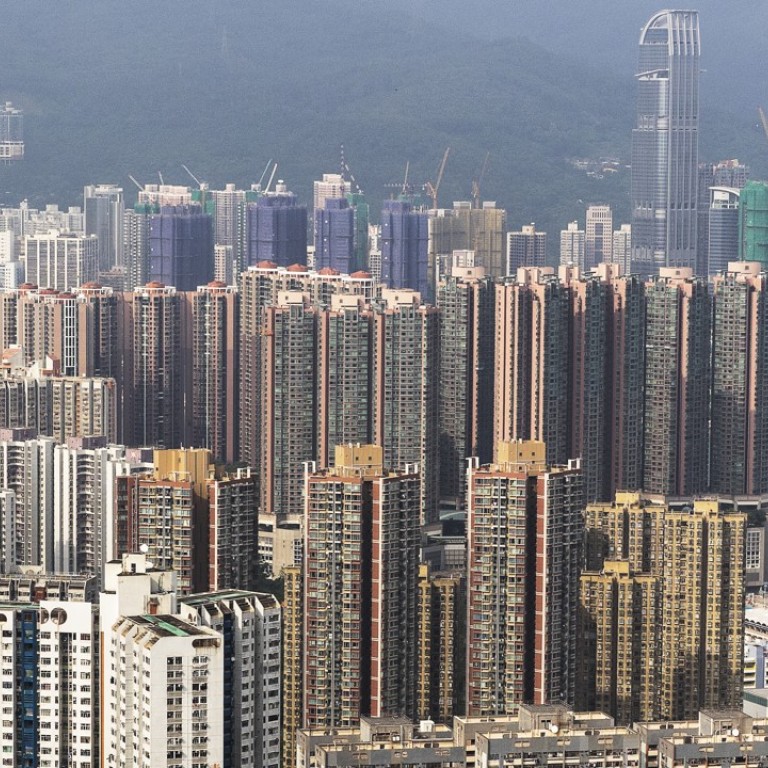
Negative equity returns to Hong Kong as small, older flats’ values drop by 20 per cent in a declining market
- Many people who bought flats in the last couple of months have seen their value decline by as much as 20 per cent
- Negative equity vanished from Hong Kong’s property market in early 2017
Scores of homeowners in Hong Kong are on the verge of falling into negative equity, with small flats in older buildings losing up to a fifth of their value in a matter of weeks.
Many people who bought flats in the last couple of months have seen their value decline by as much as 20 per cent, according to up-to-date estimates by HSBC, Hong Kong’s largest mortgage provider.
Hong Kong’s famously expensive property market has started to feel the strain lately from a fall in demand caused by rising interest rates, a struggling stock market and fears about the impact of the US-China trade war.
Negative equity occurs when a home loan exceeds the market value of the property, and has not been seen in Hong Kong since early 2017.
“Theoretically, buyers who obtained a mortgage of 90 per cent of the flat’s value will fall into negative equity once home prices have dropped more than 10 per cent,” said Sharmaine Lau, the chief vice-president at mReferral Mortgage Brokerage Services.
Industry watchers said flat owners who paid high prices for tiny apartments in older buildings may face the biggest losses because banks tend be conservative in their valuations for such flats when the market takes a turn for the worse.
“Lower valuations will first apply to flats that have less marketability. Banks’ valuations, which are supported by surveyors, are made in line with market conditions,” said Chiu Kam-kuen, head of valuation and advisory services, Asia-Pacific at Cushman and Wakefield.
The Post found flats at various old housing projects are now valued by HSBC well below their recent selling prices.
A 234 square foot unit at 36-year-old Lee Bo Building in Tuen Mun, which was sold for HK$3.82 million on October 8, is now valued 20 per cent lower at HK$3.08 million. In North Point, a 128 square foot unit at 41-year-old Yalford Building, sold on August 29 for HK$3.1 million, is also valued a fifth lower now by the bank, at HK$2.48 million.
In Kowloon, a 210 square foot unit at 34-year-old Hong Fai Building in Cheung Sha Wan sold for HK$3.87 million on June 20 is already down about 13 per cent, according to HSBC, at HK$3.38 million.
The spectre of negative equity is only going to get worse, according to Louis Chan, Asia-Pacific vice-chairman and chief executive for residential sales at Centaline Property.
“More homeowners will fall into negative equity next year as flat prices may decline by 10 per cent,” he said.
The Hong Kong Mortgage Corporation (HKMC) said it may need to adjust its mortgage insurance programme in the light of market developments.
Under the programme, buyers of flats worth less than HK$4.5 million can get mortgage loans of up to 90 per cent of the unit’s value, capped at HK$3.6 million, while for flats priced between HK$4.5 million and HK$6 million the maximum loan-to-value ratio is 80 per cent, capped at HK$4.8 million.
In the first quarter of 2018, HKMC said 6,955 applicants secured HK$26.86 billion in home loans under the mortgage insurance programme. In 2017, a total of HK$32.3 billion in mortgages were granted to 8,829 applicants, up from HK$24.6 billion of 7,145 successful in 2016.
Negative equity, the scourge of many a declining property market, peaked in Hong Kong in 2003 after an outbreak of severe acute respiratory syndrome (Sars) sent already struggling home prices spiralling.
According to HKMA figures, more than 105,000 households found themselves in negative equity territory at that time.
All of them had climbed out of negative equity by the first quarter of last year after house prices increased almost sixfold in 14 years.

